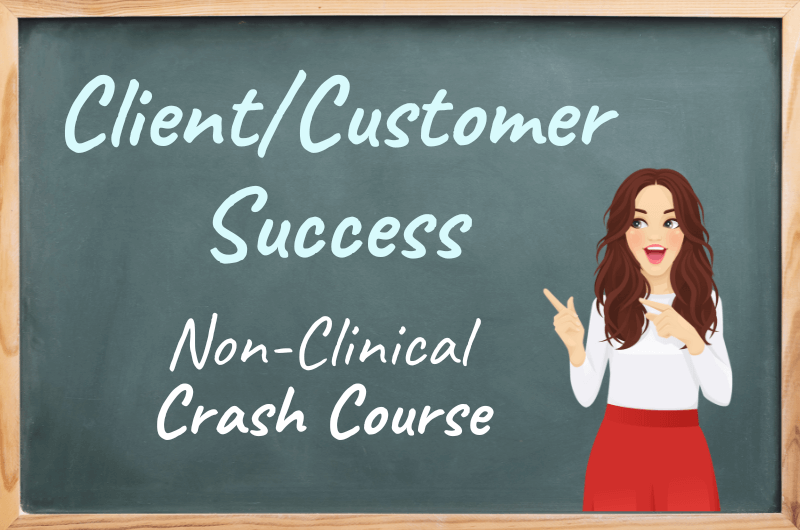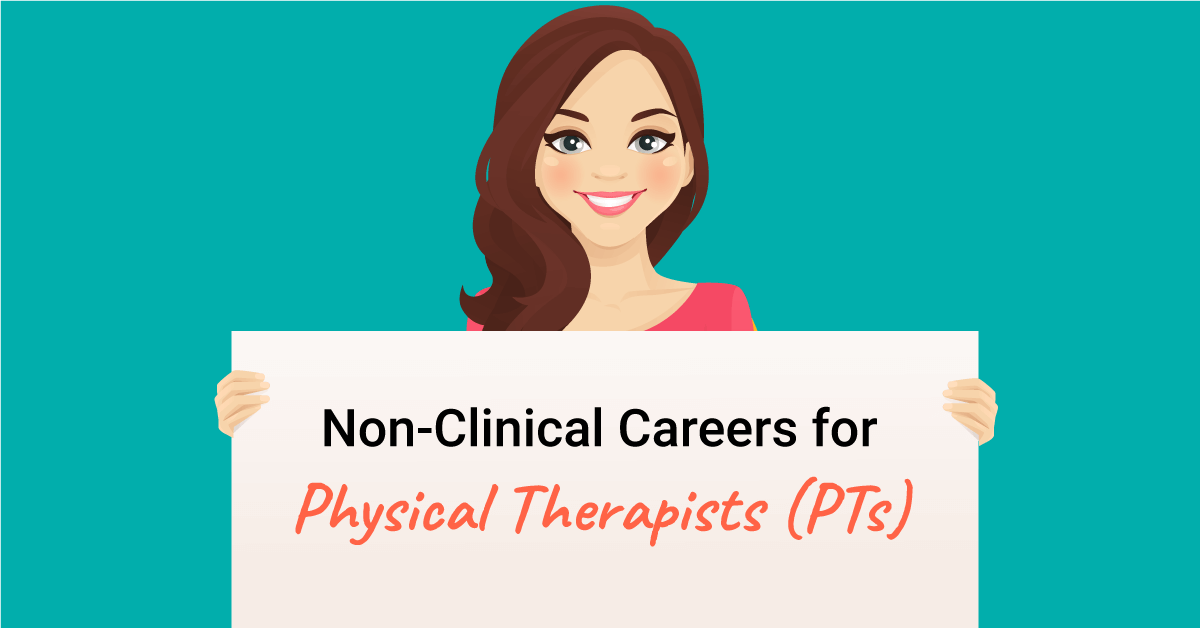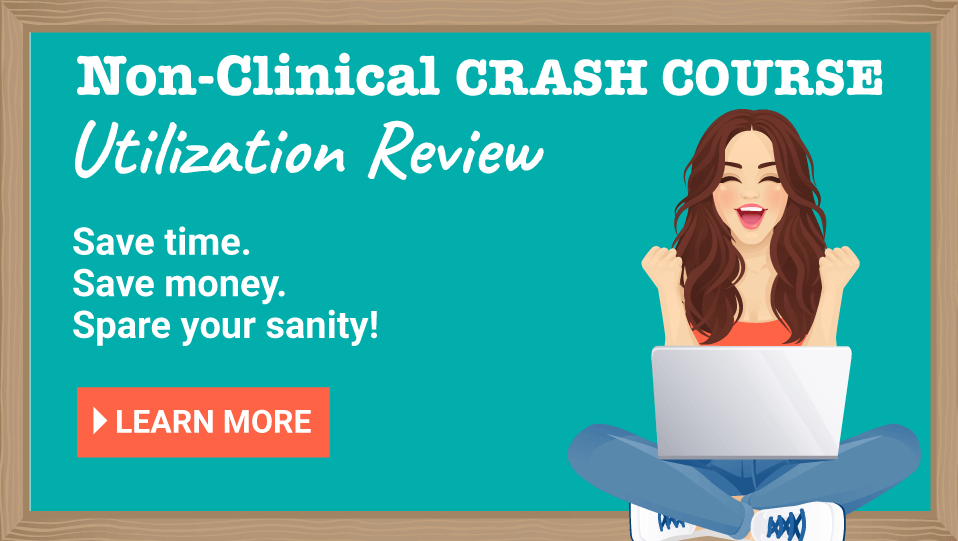Twenty years ago, the idea of choosing to leave patient care was practically unheard of. Holding a non-clinical PT job meant you sold out.
Then, around five or six years ago, things really started to shift. People started talking more about how to use a physical therapy degree to do something beyond treating patients. Between the pandemic and a remote work revolution, PTs started to rethink the idea of going into work to treat patients day in, day out.
After all, things had changed…a lot, and not just because of COVID.
Reimbursement cuts had become the norm. Managers had become more exploitative and demanding, and productivity demands were going through the roof.
Patient entitlement had hit a fever pitch, and burnout was rampant. People no longer looked at you like you had three heads if you wanted out.
These days, if you’re dreaming about a non-clinical PT job, join the club. You’re certainly not alone, and nobody is going to guilt you or shame you for exploring alternative physical therapy careers.
It’s nice to find camaraderie in the desire for a change, but more people leaving patient care means more competition for non-clinical PT jobs.
And, let’s face it, 2025 has kicked off with quite a bit of…shall we say…upheaval. Layoffs, spending cuts, and uncertainty about the future of healthcare feel SO STRESSFUL!
Is it wise to leave patient care?
Is staying put any better when government healthcare jobs are being slashed?
Ultimately, we believe that uncertain times (aren’t we all sooo done with that phrase?) are the best times for those seeking change. Uncertainty forces us to be agile, and it gives us the opportunity to invest in ourselves without the guilt of leaving stability for the unknown.
We’ve put together this article so you can get a taste of what else is out there, and we’ve linked to inspiring examples of PT professionals to show what’s possible beyond the clinic!
Table of contents
- Signs it’s time to consider a non-clinical physical therapy career
- Why we’re writing about non-clinical physical therapy jobs
- Here are 12 alternative physical therapy careers:
- Are these the only non-clinical physical therapy jobs out there?
- Where can I find non-clinical physical therapy jobs?
- What about non-clinical physical therapy jobs for PTAs (physical therapist assistants)?
This post may contain affiliate links or codes. This won’t increase your cost, but it helps keep TNCPT alive, and free of annoying ads! Thank you for your support. 🙂
Signs it’s time to consider a non-clinical physical therapy career
Before we jump into the non-clinical physical therapy careers out there, let’s briefly touch on some signs that maybe it’s time to consider leaving patient care.
- You’re searching for things like “What else can I do with a physical therapy degree?” or “I don’t want to be a physical therapist anymore” or “How to get out of physical therapy,” or even “I hate being a physical therapist.” Repeatedly. And sometimes angrily, or with tears in your eyes.
- You’re not feeling excited about your job anymore. Or, worse, you dread going in.
- You’ve tried every type of PT setting out there, and you’re miserable everywhere.
- You wish you could make more money, but you’re barely getting raises (if at all).
- You’re already working multiple jobs, but you’re still struggling to pay off your loans.
- You envy your friends who have greater flexibility or work from home.
- You’re no longer feeling connected to your patients or coworkers.
- You start stalking people on LinkedIn, looking for people who have non-clinical physical therapy jobs.
Perhaps you’re fully aware that you want to explore alternative physical therapy careers, but you’re simply not sure where to start. Or maybe you have tried applying to non-traditional roles, but haven’t had any luck landing interviews.
Maybe you’re looking ahead to a time when your body can’t handle the rigors of patient care.
Whatever your reasoning, if you’re looking for non-clinical physical therapy job options, you’ve come to the right place! A career change from physical therapy IS possible.
Why we’re writing about non-clinical physical therapy jobs
We believe if you’re unhappy in your chosen field, you shouldn’t feel stuck. You might feel like your only choice is to stick it out in a career you hate because “healthcare is stable.”
The good news is that physical therapist career options go well beyond direct patient care—now, more than ever. We also believe that if you want to explore something new, you shouldn’t have to start from ground zero and take a huge pay cut in the process.
If the list below overwhelms you, we’ve got your back. Non-Clinical 101 saves you from having to figure it all out yourself!
Without further ado, here are the top 12 non-clinical physical therapy jobs for 2024!
Here are 12 alternative physical therapy careers:
1. Value based care

You might want to leave patient care because you can’t handle how toxic the healthcare world has become. That’s relatable and you’re not wrong. But value based care (VBC) has “entered the chat,” as they say, and its goal is to fundamentally change healthcare. The premise is that VBC links reimbursements to proven clinical outcomes, thus moving the payment model away from the fee-for-service model.
VBC may or may not be the panacea healthcare so desperately needs…but there are plenty of jobs in this space, regardless. It’s a newer concept, so much of the work is found at tech-based companies, while other jobs are within insurance companies and existing healthcare systems. These roles are all about relationship-building, creating strategic partnerships, and ensuring that providers are supported and understand what they need to do to receive reimbursement.
Pros:
- Opportunity to change healthcare by using existing education and background
- Solid pay that is often aligned with clinicians to start, and goes up from there
- Clinical licensure (PT/OT/SLP background) often coveted in these roles
- Lots of work from home options
Cons:
- VBC might not significantly improve or fix healthcare at all; that’s a tall order to fill
- The new nature of these jobs (and companies providing said jobs) mean potential layoffs
- It can be challenging to find work if you’re an assistant or do not have a bachelor’s degree (but you do have options)
Check out these spotlights on PTs now working in value based care!
- Larissa Pauly – Special Episodes Team Manager
- Lori Pearlmutter – Population Health Director
- Angela Diaz – Provider Solutions Growth
- Dana Strauss – Senior Director, Government Affairs
- Chentelle Lane – Chief Operating Officer
- Brandy Golden – Vice President of Operations
2. Customer/client success
If you’re a “people person,” but you don’t enjoy the clinical aspect of patient care, you might really enjoy a career in client/customer success. This type of work is very people-oriented, and your days are busy without feeling overwhelming (for the most part).
Customer/client success (CS) professionals focus on ensuring customers get a good experience with whatever product, service, or device they purchase. Someone in CS might do everything from training and onboarding to communicating with clients when they have questions. A CS professional might also be responsible for renewing contracts and upselling.
Pros:
- Incredible growth opportunities (in terms of pay and career paths)
- Work from home and hybrid options are plentiful
- You can hop out of the healthcare world into other industries fairly easily
Cons:
- Pay might be a slight decrease from a clinical salary when you first get started
- Field is getting more competitive, so upskilling is recommended to stand out from other applicants
- Many roles are in the tech world; luddites generally need not apply 🙂

Check out these spotlights on PT/As now working in client/customer success!
- Ariana Adler – Success Manager
- Jessica Manson – Customer Success Representative
- Somer Meyers – Client Success Manager
- Nandita Ramasubramaniam – Success Manager
- Emily Graves (Cassata) – Head of Customer Success
3. Data analytics

As healthcare moves more toward the aforementioned value based care model, there is increased emphasis on outcomes. And outcomes are measured by—you guessed it—data!
Data is collected everywhere, including our trusty EMRs, wearables, annual financial reports, and patient satisfaction surveys. Said data is being harnessed to determine what is working…and what is not working.
Thus, there’s a growing need for data analysts in the healthcare world. Clinical data analysts, clinical analysts, or whatever you want to call them, generally enjoy a calm, predictable lifestyle with lots of opportunity for upward mobility.
Pros:
- Clinical data analytics jobs pay well, and they offer excellent upward mobility
- The work is relatively calm and predictable, with few “emergencies”
- If you’re sick of being “on” all day, this work is great for solo workers who enjoy down time
Cons:
- You will typically need to upskill (bootcamp, relevant courses, or formalized education) to land a job
- These roles are becoming more competitive as people switch into the data profession
- Sometimes the work can feel monotonous; standing desks and scheduled breaks are recommended
Check out these spotlights on PTs now working in data analytics!
4. Education

Physical therapists make excellent educators. Our jobs as PTs and PTAs always entail educating patients, caregivers, families, and other healthcare professionals every single day.
Education is a natural transition for many physical therapists seeking non-clinical jobs.
The fact that education is number one on this list probably comes as no surprise to you; education is one of the most popular non-clinical career paths in our field. For years, physical therapists have been going into education when they’re ready to leave the clinic.
What you might not realize is that PTs aren’t limited to teaching at physical therapy schools. After all, there are PTs living all over America, but there aren’t PT schools everywhere.
Luckily, there are institutes of higher education pretty much everywhere, if you’re willing to commute a half hour or so. PTs are perfectly qualified to teach at the community college, university, and graduate level, especially in courses like anatomy and biomechanics.
Also, with the advent of more and more online education programs, PTs are in the perfect position to pick up courses to teach online, or even work with companies like MedBridge to create online CEU classes or teach webinars from home! Indeed, working from home as a PT is very possible if you pursue education!
Nicole Tombers, PT, DPT, does a great job of explaining physical therapist career options in education in this article.
Pros
- You’ll keep your PT knowledge fresh in some areas
- You’ll truly help shape the next generation of clinicians
- Flexibility and reasonable pay
- You’ll enjoy watching students succeed
Cons
- You’ll be grading papers, preparing lessons, etc. outside of your actual teaching hours
- You’ll likely start out as adjunct, meaning it’s not a clean break from patient care
- You may be required to stay clinical to some degree (if you teach at a PT school)
- You’ll occasionally see an unsuccessful student, which can be painful
- Assistants need master’s degrees to have many options…and even then it can be tough to break in
Check out the spotlights below to learn more about therapists who’ve become educators!
- Emily Gherghel – Lead Learning and Simulation Developer
- Kyle Coffey – Exercise Physiology Program Director
- Ed Kane – Professor at University of St. Augustine
- Adrienne Nova – PTA Clinical Director > Manager of Content Development
- Jason Ashby – PTA Program Director
- Molly Miller – Quality and Outcomes Specialist
- Eric Trauber – Director of Clinical Education
- F. Scott Feil – Core Faculty at PT School
- Shana Carter – Assistant Clinical Professor
- Annie Wysock and Michael Leavitt – Physiotherapy Lecturers and Programme Leaders
5. Utilization review

Utilization reviewers (also known as clinical reviewers or therapy reviewers) typically work for insurance companies (or companies that contract with insurance companies), and their roles generally involve reviewing cases, and approving, denying, or otherwise managing insurance claims.
Utilization review jobs are sometimes remote/work-from home (or at least offer some flexibility with hours), and they generally require at least a few years of clinical practice in a specific setting.
For example, if you’re working for a pediatric clinical reviewer job, it will help immensely if you have several years of experience with treating kids as a peds PT.
You can check out a more extensive article we wrote about utilization review here.
Pros
- You’ll likely enjoy partial or fully remote work
- You’ll be able to fight fraudulent billing practices
- You’re definitely still leveraging your degree
- You’ll likely enjoy a reasonable salary
Cons
- There’s sometimes pressure to decline treatments, even when you deem them medically necessary
- Jobs often have productivity requirements and require extended time at your desk
- Other therapists (and the general public) might not be your biggest fans
- You might feel isolated or bored at times
- Finding UR work can be tough for assistants
Check out the spotlights below to learn about PTs who have pursued careers in utilization review.
- Tambi Rondinone – Clinical Review Coordinator
- Andrea Jansen – Pre-Service Coordinator
- Jennifer Lane – Therapist Reviewer
- Andrea Koren-Shemesh – Home Health Care Coordinator
- Aaron Hackett – Physical Therapy Reviewer
- Bill Daly – Denials Coordinator
- Bryce Williams – Home Health Quality Review Specialist
- Erick Alvarez – PT Medical Management Director
- Amy Elder – Clinical Documentation Specialist
- Jill G. Sutton – Clinical Review Coordinator
6. Rehab technology and innovation

Ever thought of working with robots? What about running clinical trials for innovative devices designed to help stroke patients? How about using artificial intelligence (AI) to improve all of the above?
As it turns out, tons of physical therapists are being hired into the tech world as clinical trainers (sometimes called sales trainers), marketers, consultants, and more! These alternative physical therapy careers are on the rise. There is also a huge area of opportunity in VR rehabilitation.
Our backgrounds make us incredible assets to tech companies in all sorts of non-clinical jobs. As engineers and designers work create technology to help patients become more mobile, PTs’ input is crucial. What seems painfully obvious to us after working with scores of patients might never cross a designer’s mind when she is placing a button on a device.
The technology space is HUGE, and quite a few of our Non-Clinical 101 graduates have opted to work in rehab technology so they have the upward mobility and high pay this career path is known to provide.
Pros
- You’ll feel like you’re on the cutting edge of developments that will truly transform how we operate as clinicians
- Unprecedented creativity options
- Excellent pay and upward mobility potential
- You’re uniquely positioned to offer clinical expertise in a sea of techie and engineer types
- This is a great time to leverage understanding of AI to join the rehab tech world
Cons
- You may wind up working long hours, or traveling quite a bit, depending on your role
- You’ll see a wide variety of pay; physical therapy jobs at startups don’t always pay well, but established companies do
- You might need to take some upskilling courses to learn additional skills you’ll need on the job
Check out the spotlights below to learn more about therapists who’ve gone into tech roles!
- June Srisethnil – Clinical Product Manager
- Liana Merkel – Client Success Associate
- Jessica Manson – Customer Success Representative
- Anna Kilbourn – Clinical Appeals Specialist
- Lily Belcak – Director of Enterprise Client Success
- Merci Greenaway – Physiotherapist in Residence
- Melissa Klaeb – Clinical Consultant
- Ben Galin – Chief of Product
- Angela Forsyth – Program Director
- Stephanie Miller – Clinical Analyst
- Marla Ranieri – Chief Development Officer
- Matt Fuller – Clinical Training Manager
- Rebecca Tarbert – Director of Clinical Programs
- Michelle Stewart – Clinical Consultant
- Jeremy Hall – Clinical Solutions Consultant
- Anang Chokshi – Chief Clinical Officer
- Jennifer Stoskus – Director of Clinical Education & Training
- Luke Mountz – CX Research Associate & Voice of the Customer
- Beth Lind – Software Tester
- Jon Ide-Don – Director of Clinical Programs
7. Clinical/rehab liaison

A clinical or rehab liaison is responsible for filling the beds of a rehab facility with appropriate patients. These types of non-clinical jobs have a strong marketing and sales angle, as you’re often trying to build referral relationships with physicians, case managers, and SNFs.
Clinical liaison roles tend to be pretty flexible, and they’re great for those who work both independently and on teams. These roles often require a clinical license, and you still spend quite a bit of time with patients—just not treating them directly.
We wrote an article on how to become a rehab liaison, and you should check it out!
Pros
- It’s pretty easy to move into a clinical liaison career, especially if you’ve worked in acute care and/or inpatient rehab
- These roles pay pretty much what you’d make in an acute care job
- You still get to work with patients, but in a much less physically and emotionally demanding way
- These roles are typically quite stable
Cons
- There’s not always a direct career growth path for these roles, though you can transition into sales or marketing if you want
- There can be some pressure to meet census quotas
- Sometimes, case manager and doctors can try to push you around a bit
- Assistants may or may not be eligible for hire in these positions; company policies vary
Check out the spotlights below to learn more about folks in clinical liaison roles!
- Megan Umberger – Clinical Rehabilitation Specialist
- Amber Hammock – Clinical Rehab Liaison
- Allison Solari – Clinical Liaison
- Abolaji Ogundele – Business Development Clinical Liaison
8. Recruiting
Recruiting is an incredible career path for rehab professionals, especially those who have done some travel physical therapy in the past.
Physical therapy recruiters work with employers and rehab professionals, trying to ensure good matches for various job roles. For example, you might work as a healthcare recruiter (or talent acquisition specialist) for a staffing company, and your role would be speaking with facilities who are looking for PTs, then finding PTs who look good for those roles. You’d do the initial screening of applicants, and you’d earn a paycheck based on whether you’re able to fill open positions.
Some PTs choose to become independent recruiters, which is a great option if you don’t need consistent income while you’re building your client base.
Pros
- Enjoy meeting, and networking with, all sorts of people
- Use existing connections to help find the right professionals for the right roles
- You’ll enjoy a high salary if you’re good at your job; it’s often commission-based
- Assistants typically have options in these careers
Cons
- You’ll have to “eat what you kill,” as commission-based roles require an assertive, proactive personality
- You may have times where you feel like you’re fitting a square peg in a round hole, just to make that job placement
- It can be challenging to convince a recruiter to give a PT a chance in a totally new role. Read how one OT bombed her healthcare recruiter interview to learn valuable lessons—but she’s now a recruiter, so it all worked out 🙂
Check out the spotlights below to learn more about folks in recruiting roles!
- Nina Luskin – VP of Client Services, Nursing and Allied Health
- Christine Minnix – Director of University Recruiting
- Ashley Aliberti – Therapist Network Specialist
- Melissa Erlandson – Network Development Specialist
9. Writing

There’s a huge need for educated rehab professionals in the online world. From patient-facing clinical copy to business-facing professional medical education, there are so many opportunities to use your background as a health writer.
Writing roles vary greatly. You might work as a clinical content writer, or as a health copy writer. You can work for large organizations or freelance with smaller clients.
You can even work as a medical writer, which is entirely different! These roles tend to have better pay, but they can also be more stressful and demanding, and they usually require either a PhD or additional formalized medical writer training. Some companies will even hire PTs into content strategy roles!
We’ve got a lot of additional content on this topic:
- How to launch a non-clinical career as a copywriter
- Getting your article published online
- Health blogs that publish guest posts from therapists
- Grammar guide for physical therapists
Pros
- Enjoy unprecedented flexibility and creativity
- Many work-from-home options
- You’ll get to leverage your degree and build a name for yourself at the same time
- You’ll have tons of paths to take, from marketing, to strategy, to editor-in-chief
- Assistants tend to have solid options in this career path, especially when they have a BA/BS degree
Cons
- The work can be sedentary and repetitive; a standing desk and scheduled breaks can help break the monotony
- You’ll probably have to break into the field slowly, building your portfolio, then transitioning out of patient care
- You’ll usually take an initial pay cut if you go straight into full-time writing work, but the pay does grow over time
- To be successful in writing, you’ll need to know how to use AI to improve your workflow — without relying on it altogether
Breaking Into Health Writing, by Health Writer Hub, is another great course—and it’s quite affordable for what you get, especially after the exclusive discount for The Non-Clinical PT readers! Learn more about the course here, but be sure to use our affiliate link to save 20%.
This course is a great introduction for a new or aspiring copywriter needs to understand how to actually start writing. It covers types of writing that are out there (medical vs. marketing vs. health, etc.), and it explores what you need to make an actual plan to get there. We highly recommend this course if you’re looking for a writing career where you write content for other companies.
Click here to save 20% on Breaking into Health Writing! (by Health Writer Hub)
Check out the spotlights below to learn more about folks in writing roles!
- Calista Kelly – Managing Editor
- Courtney Smith – Marketing Copywriter
- Zoe Faselt – Content Writer and Training Developer
10. Sales

Clinicians might find themselves envious of the DME reps who breeze through the clinic, fitting patients with devices or performing in-services, before tossing some doughnuts on the table, and going on their merry way.
Obviously, there’s more to medical sales than dropping off doughnuts and products, but sales is a stimulating and social role that’s great for people who enjoy building relationships, meeting goals, and setting their own schedules.
If you’re an sales rep, your role is to represent your product, so you need to know it inside and out. You are also responsible for maintaining (and sometimes starting) relationships with various businesses.
You can either land a full-time, benefited role as a medical sales rep, or you can try your hand at sales by taking on a commission-only DME sales rep gig.
Pros
- Excellent pay with a ton of upward mobility in terms of salary and title growth
- Lots of flexibility and freedom to plan your days as you wish
- You’ll be able to leverage your degree and existing industry connections
- Assistants tend to do well in these positions
Cons
- You might be on call during nights and weekends in some roles
- You’ll likely have a lot of traveling and some pressure to meet quotas
- You’ll need to be good at working independently, and you’ll need to get into the mindset of selling
Check out the spotlights below to learn about PT/As in sales roles!
- Adam Quire – formerly Specialty Account Manager, now Clinical Training Manager
- April Hoffman – Territory Manager
- Allan Manuel – SMB Sales Specialist
- Michael Frasso – Account Manager
- Jasmine Taylor – Specialty Program Manager
- Jack Scott – Territory Sales Manager
- Ben Barron – VP of Enterprise Sales
- Anna Manor – DBS Clinical Specialist
- Ricardo Robles – Sales Specialist
- Jeff Caulfield – Product Specialist in Joint Reconstruction
- Josh Young – Joint Reconstruction Representative
- Caitlin Jones – National Sales Director
- Preston Collins – Strategic Account Manager
- Matthew Holland – Account Executive
- Cory Hutchins – Sales Development Representative
- Greg Martinez – Head of Partnerships and Clinical Sales
- Lisa Apple – Territory Manager
- Dana Lindberg – Associate Sales Representative
- Matt Crow – National Director, Cardiac Rehab
- Sheila Mallon – Territory Manager
- Krista Berzonsky – DBS Clinical Specialist
- Rachel Mentzel – Account Manager
- Michelle Fritz – Medical Supply Account Manager
11. Entrepreneurship

In the past, entrepreneurial-minded PTs were guided to clinic ownership, and that’s about it. These days, you’ll find PT/A professionals running incredibly unique and innovative businesses, many of which have nothing to do with patient care!
The key to becoming a PTpreneur is to identify a problem, then provide a solution, making your entire mission to delight your customer/client in the process.
Whether you opt to take the path of digital entrepreneurship or you start your own business traveling to teach CEU courses, you have a ton of options to make your own unique mark on the world without walking away from all that time and money you invested in this career.
2025 might feel filled with uncertainty, but fortune favors the bold. All things considered, uncertain times often lead to incredible business opportunities!
Pros
- You have the ultimate say in your work, meaning your values are key to driving your mission
- You’ll be able to work from anywhere you want
- PTAs can be very successful in this type of work
- You can truly create change and impact people’s lives, without dealing with the demands of patient care
- You can start out your endeavor as a side hustle, and it can grow on your own schedule
Cons
- Running a successful business takes commitment, drive, and belief in yourself
- You’re never fully “off,” as even if you have employees, if someone calls out, you have ultimate responsibility to make sure things continue running
- You won’t get a steady paycheck for a long time, and you’ll initially go without perks many folks take for granted, such as PTO, 401(k), and health/dental benefits
We worked with Chanda Jothen from Pink Oatmeal to put together a blogging course to help you learn from our successes (and our mistakes), so you can build, grow, and monetize your own website!

Check out the spotlights below to learn more about therapists in entrepreneurial roles!
- Alex Courts – Co-Creator of Postpartum Recovery Timeline
- Catherine Smith – Founder of CJCopySmith Agency
- Chanda Jothen – Founder of Pink Oatmeal
- Heidi Jannenga – Co-Founder of WebPT
- Will Hall – CEO of HIPnation
- Kim Bell – Founder of The Bell Method
- Brianne Grogan – Founder of FemFusion Fitness
- Joses Ngugi and Casey Coleman – Founders of Pre-PT Grind
- Nicholas Rolnick – Founder of The Human Performance Mechanic
- Tony Cosenzo – Founder of Fibonacci Health
- Keith Cronin – Consultant and Manufacturer
- Jen Esquer – DocJenFit of The Mobility Method
- Meredith Castin – The Non-Clinical PT
- TaVona Boggs – Founder of Wellness PTs
- Kim Rondina – Mindset and Professional Coach
- Jim Aguilar – Founder of Periscope
- Laura Keyser – Co-Founder of Mama LLC
- Keith Rosenliao – Founder of Cayuga Climbs
- Carrie Black – President of Integrity Home Mobility
- Beverly Theodore – Co-Founder of Meraki Fit
- Theresa Larson – Founder of Movement Rx
- Felipe Fidalgo – Co-Owner of GreenLight Mobility — Charlotte
12. Telehealth PT
We debated whether to include telehealth physical therapy on this list, as it’s considered clinical work by many people. But telehealth is so flexible and hands-off, many PTs find it to be liberating compared to traditional patient care.
Telehealth PT is physical therapy delivered over electronic means, rather than in person—and this is great news for someone looking for telecommute physical therapy jobs (especially if they still love patient care)! There are several ways to get into telehealth:
- Join an existing company that provides telehealth services. You can sign up as a staff teletherapy provider and be part of a pool of therapists providing services remotely. You’re paid like a staff therapist and don’t need to worry about business considerations like billing or patient acquisition.
- Start your own telehealth PT company. The other option is to start a company where you provide telehealth as a solo practitioner. This means finding patients, setting up the tech yourself, and other concerns, but there are solutions to make this easier!
Pros
- It’s a way to truly keep using your degree and knowledge, without burning out your body
- You’ll be able to work from anywhere you want, and in all sorts of settings, including sports or school-based telehealth
- You’ll be part of a major sea change in our profession, which is exciting and prevents boredom
- Many companies have begun hiring PTAs
Cons
- You’ll often take a pay cut from in-person care, but this is not always the case
- It can get old performing the same old patient care you know from behind a screen; in many ways it can feel more challenging than simply going into a clinic
- Some therapists struggle to get the same results online that they do in person
- With recent government cuts, the future of reimbursement for telehealth is tenuous
Check out the teletherapy spotlights below:
- Olivia Matta – Hybrid Physical Therapist
- Carly Cooper – Clinical Operations Team Lead
- Elana Shinkle – Teletherapy SLP (Speech-Language Pathologist)
- Ellen Morello – Clinical Program Manager
- Kelsey Quam – Digital Health Physical Therapist
- Julie Mulcahy – Senior Clinical Program Manager
- Emil Berengut – Director of Clinical Operations
- Tony Rost – Senior Director of Scheduling and Telehealth
- Sam Mink – Hybrid Physical Therapist
- Priya Sheth – Telehealth Physical Therapist
Are these the only non-clinical physical therapy jobs out there?
Absolutely not! You can pursue so many other non-clinical PT jobs with your background, including:
- Compliance/quality management/performance improvement
- Consulting (senior consultant)(business consultant)(regional rehab consultant)
- Public health
- Canine rehabilitation
- Working for pharmaceutical marketing agencies
- Clinical informatics
- Supervisor of patient trainers
- User experience (UX consultant)
- Head of corporate healthcare relationships (leadership!)
- Program/project/product management
- Performance management
- Operations (operations analyst)(operations manager)(regional director of operations)
- Care coordination (cross market care coordinator or skilled inpatient care coordinator)
- Medical coding
- Home modifications
- Director of program management
- Executive director of digital health & area manager
- Clinical strategy leadership (clinical strategy specialist or analyst)
- Content creator
- Scrum master and agile coach
- Program consultant for digital analytics and strategy
- Director of clinical programs
- 3D printing clinical specialist
- Senior LDRP specialist
- Data science
- PT innovation
- Implementation manager
- Client executive
- Practice specialist
- SO MUCH MORE!!!!
In our flagship course, Non-Clinical 101, we cover 27 career paths (with numerous job titles within them!) that are perfect for physical therapists looking for a change. You’ll find sample resumes and cover letters for each path, as well as information on how to apply for jobs, network, interview, and negotiate salary. The best part? Each career path is mapped out to help you identify which one is right for YOU, based on personalized self-assessments. Don’t take it from us, though. You can read success stories here!
Where can I find non-clinical physical therapy jobs?
We’re so glad you asked! You can sign up for our free email list to get non-clinical jobs delivered to your inbox on most Sundays! Non-Clinical 101 alumni get early access to all of our jobs!
What about non-clinical physical therapy jobs for PTAs (physical therapist assistants)?
Many of the above roles are perfectly appropriate for PTAs, but if you’re curious to learn more about what is specifically out there for you, you might want to check out this article from Sean Hagey, PTA. He has a really cool non-clinical consulting role at a telehealth company!












